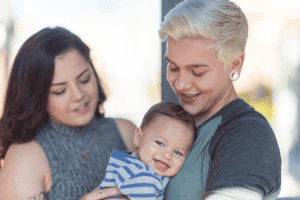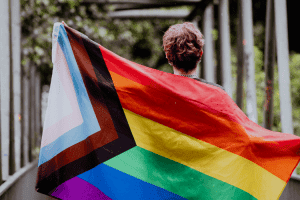Did you know, that in 2019, the Office for National Statistics showed that there were 212,000 same-sex families in the UK? 2020 statistics also show that 1 in 6 adoptions in England were to same-sex couples! 2022 marks the 50th anniversary of the very first Pride march in the UK. To celebrate Pride History Month 2022, we’re taking a look into the history of LGBTQ+ families in the UK, the different options those in LGBTQ+ relationships have to grow their family and some extra resources for those who need them.

Influential Moments In LGBTQ+ Law
Let’s kickstart our celebration in Pride History Month 2022 by acknowledging some of the key milestones that helped to move our nation forward to equalise opportunities for LGBTQ+ families:
The Adoption and Children Act 2002
This legislation allowed same-sex parents to become full and equal legal parents! The law meant that same-sex partners could adopt their partners’ children and female same-sex parents who already had children together, could apply to both become legal parents.
The Civil Partnership Act 2004
Allowed same-sex couples to register with all the same legal rights and responsibilities of marriages, helping protect LGBTQ+ couples financially and begin the journey towards equal marriage.
The Human Fertilisation and Embryology Act 2008
This law allowed female, same-sex couples to be registered on a child’s birth certificate. If they conceive at a UK fertility clinic, couples in civil partnerships could now be recognised as their children’s joint legal parents from birth.
In 2010, the same Act enabled male same-sex couples to apply for a parental order, this gives a child through surrogacy a UK birth certificate, with two men noted as their legal parents. These orders also encouraged UK surrogacy matching organisations to advocate for same-sex parents.
The Marriage (Same Sex Couples) Act 2013
Finally allowed male and female same-sex couples to marry in the exact same way as heterosexual couples!
The Children and Families Act 2014
Enabled same-sex parents, through surrogacy, to claim the same rights to time off work and pay as parents giving birth or adopting a child.
The Human Fertilisation and Embryology Act 2008 (Remedial) Order 2018
In a 2016 court case, a ruling showed that the law was directly and unfairly discriminating against a single dad in surrogacy. This law allowed for single parents, through surrogacy, to apply for a parental order, enabling them to become the child’s sole legal parent.

3 Most Common Ways To Have A Baby If You’re LGBTQ+
1. Donor Insemination
This process involves inserting donated sperm - from a friend or anonymously - inside the person who is going to carry the baby, either at home or at a fertility clinic. Lesbian couples who are civil partners at the time of conception (at a licensed clinic or by private arrangement at home) are both treated as their child’s legal parents. If a couple who are not in a civil partnership, conceive at a licensed clinic, they will also be treated as their child’s legal parents.
However, if non-civil partners conceive through donor insemination via a private arrangement at home, the non-birth mother has no legal parenthood and therefore has to adopt the child to obtain parental rights.
2. Adoption or fostering
In the UK, LGBTQ+ couples can adopt or foster a child together. In the same process as a heterosexual couple, you need to apply to adopt or foster through a local authority or agency and complete an assessment. Find out more about adoption and fostering here.
3. Surrogacy
Surrogacy involves another individual having a baby for a couple who cannot have a child themselves. Like all of these alternatives to ‘traditional’ conception, this common practice is undertaken by both heterosexual and LGBTQ+ couples alike. In the UK, surrogacy is completely legal, however it is illegal to advertise for surrogates and no financial benefit other than reasonable expenses can be paid to surrogates. After the child is born, a parental order must be issued to confirm they are legally yours. Until this order is issued the surrogate does have the right to keep the baby.
Our Mama Anna from @officialmysurrogacyjourney tells us all about her experience with gestational surrogacy, here.
Trans and Non-binary parents
Transgender people have the same rights as anyone else when it comes to adoption and fostering. Treatment can also be arranged, if you’re undergoing or considering starting gender-affirming surgery, to help you preserve your fertility if you would like to have a biological child in the future.

Further support
FFLAG
A national voluntary organisation and charity dedicated to supporting families and their LGBT+ loved ones.
Confidential helpline: 0300 688 0368
Email: support@fflag.org.uk
New Family Social
Helping LGBTQ+ families when deciding if adoption or fostering is right for them and supporting couples on their journeys to becoming parents and carers.
Phone: 020 3880 2683
Website: https://newfamilysocial.org.uk/nfs-contact-us
Switchboard LGBT+ helpline
A safe space to discuss anything LGBTQ+, operating 10am – 10pm 7 days a week
Phone: 0300 330 0630
Chat: https://switchboard.lgbt/contact
Email: chris@switchboard.lgbt
Mermaids
Supports transgender, nonbinary and gender-diverse children and young people as well as their families and professionals involved in their care.
Phone: 0808 801 0400
Email: info@mermaidsuk.org.uk
Chat: https://mermaidsuk.org.uk/contact-us/
The Bestsellers
Ready for the temperatures to rise? Explore our top 5 tips to being pregnant in Summer, here!







